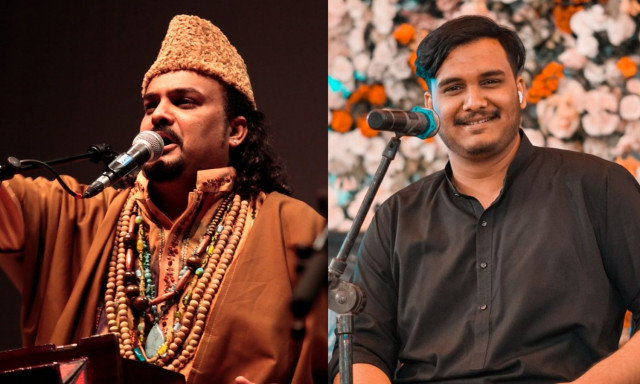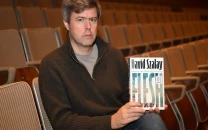We were all on his bed playing Ludo: Amjad Sabri's son recalls the day his father was assassinated
The qawwali singer’s son shared the aftermath of the tragedy and how he wants to continue his father’s work

On June 22 2016, the day the murder of renowned qawwali singer Amjad Sabri rocked the country, his eldest son Mujadid was laid up with a broken leg. As his father was gunned down, Mujadid was at home playing board games with no hint of how life was about to change forever. Speaking to TCM Originals on YouTube in memory of his father, Mujadid, who was thirteen at the time, recalled how their world was turned upside down.
“My father had just had a shower and gone out,” he said. “My leg was bandaged up, and we were all on his bed playing Ludo. Then just forty minutes later, there was a knock on the gate. It was an elderly man we didn’t know, and he said that our father had just been assassinated.”
Mujadid, the eldest of five siblings, remembered how almost instantly, the family home was swarming with people gathered together to help the family, most of whom were strangers. Within minutes, the entire street outside the house was clogged with people.
“We didn’t even know who was who,” remembered Mujadid. “Outside on the road, it was so full that all we could see were the tops of people’s heads. We had no idea where our father was, and we just piled into different cars and rickshaws to try and find him at different hospitals. It was chaos.”
In addition to having a melodious voice that was the pride of nation, the jolly good-natured Amjad, who took great pride his humble background, was a unifying force bringing together those from all walks of life, shown in the sheer scale of people banding together to help the family in the immediate aftermath of the singer’s death. According to Mujadid, once all the pandemonium had subsided, countless people came to tell his mother just how much his father had supported them financially or otherwise. “After the death, I lost count of how many families came to us to say how my father used to help them. Even my mother didn’t know the extent to which he went out of his way for others. Everyone knew him as a jolly man, and he was so down to earth, and sensitive to others’ problems.”
Mujadid - whom Amjad affectionately called ‘Mujji Mian’ - remembered his father first and foremost as a friend, and no different to the friendly persona he always displayed to the general public. “My father was like a friend to us,” he said. “He was very jolly, very frank, and always told me to first focus on my studies, and that I could do whatever I wanted to afterwards.”
Today, the family continues to live in the same house, which was built by Amjad’s own father, and initially intended to be a school. However, with time, the needs of the family outweighed the pressure to build a school, and the house has remained the family home ever since being built by Mujadid’s grandfather. “Everyone is emotionally attached to this house,” explained Mujadid, which would explain why Amjad never sought to move to a more affluent area.
As the eldest son, the otherwise shy Mujadid said he felt the pressure to follow in his father’s footsteps, even though he had refrained from joining him in concert during his lifetime. “When my father would perform in concert, my younger brothers and cousins would sometimes join him on stage, but I would hide behind my mother,” said Mujadid. However, over time, Mujadid said he has developed an interest in qawwali himself to drive forward the legacy of his illustrious father, and yearns to have the opportunity to share the stage with him now that he is older.
“Two years after my father died, my taya also passed away,” shared Mujadid. “So we all lacked the proper guidance when it came to music. We had to figure it out on our own, but alhamdulillah we are doing fine now. It would be so great to go up behind my father on stage if he was here today.”
Amjad Sabri’s qawwali performances were highly acclaimed throughout Pakistan and beyond. His final project before his death was with Coke Studio, where he performed Aaj Rang Hai with Rahat Fateh Ali Khan.
Have something to add to the story? Share it in the comments.



















COMMENTS
Comments are moderated and generally will be posted if they are on-topic and not abusive.
For more information, please see our Comments FAQ